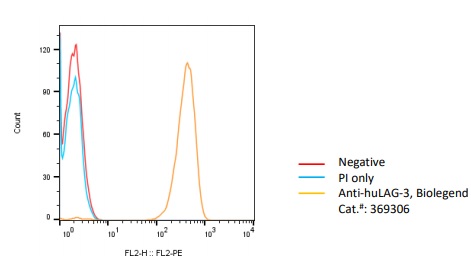
| Catalog Number | Product | Size | Price | |
|---|---|---|---|---|
| C1010 | Human LAG-3 CHO-S Stable Cells | 2 vials | $4950 | Order |
| Catalog Number | C1010 |
|---|---|
| Cell Line Name | Human LAG-3-CHO-S Stable Cell Line |
| Accession Number | Codon optimized from NP_002277.4 (Met1-Leu525) |
| Host Cell | Suspension CHO |
| Quantity | Two vials of frozen cells (2x106 per vial) |
| Culture Medium | 50% CD-CHO (Gibco #10743-029), 50% Ex-Cell CHO 5 Media (Sigma #C0363), supplemented with 8mM L-Glutamine, 1xHT, 1x Penn-Strep and 20ug/ml puromycin |
| Freezing Medium | 90% FBS and 10% DMSO |
| Storage | Liquid nitrogen upon receipt |
| Product Datasheet: | Download PDF |
Detection of human LAG-3 expression on human LAG-3 CHO Stable cells using a mouse monoclonal antibody specific for human LAG-3.

Lymphocyte-activation protein 3 (LAG-3) belongs to the immunoglobulin superfamily and shares sequence homology, exon/intron organization andchromosomal localization to CD4.LAG-3 cDNA encodes a 498 amino acid transmembrane protein with 4 extracellular Ig-like domains.The expression of LAG-3 is undetectable in resting peripheral blood lymphocytes but it is induced in activated T and NK cells. Human MHC Class II molecules can bind to LAG-3 and are considered as receptors for LAG-3 on B cells and dendritic cells. LAG-3 is proven to be an inhibitory receptor on activated T cells. Crosslinking of LAG-3 on activated T cells with an anti-LAG-3 antibody inhibits T cell proliferation and cytokine secretion. Anti-LAG-3 antibodies which blocked LAG-3 binding to MHC class II molecules had strong anti-tumor activity when used in combination with anti-PD-1 antibodies in tumor xerograph models.
Triebel F. et al., LAG-3, a novel lymphocyte activation gene closely related to CD4. J Exp Med. 171:1393-405. 1990.
Baixeras E. et al., Characterization of the lymphocyte activation gene 3-encoded protein. A new ligand for human leukocyte antigen class II antigens. J Exp Med, 176:327-37. 1992.
Hannier E., et al., CD3/TCR complex-associated lymphocyte activation gene-3 molecules inhibit CD3/TCR signaling. J Immunol. 161:4058-65. 1998.